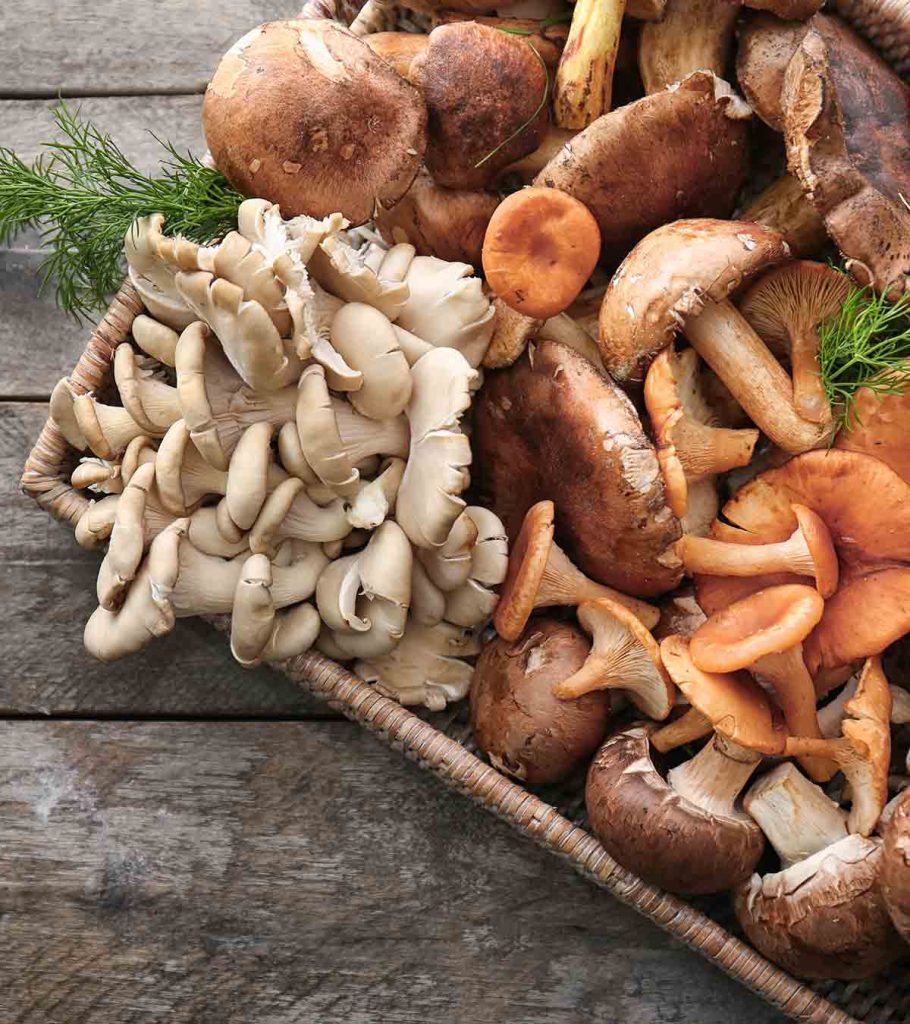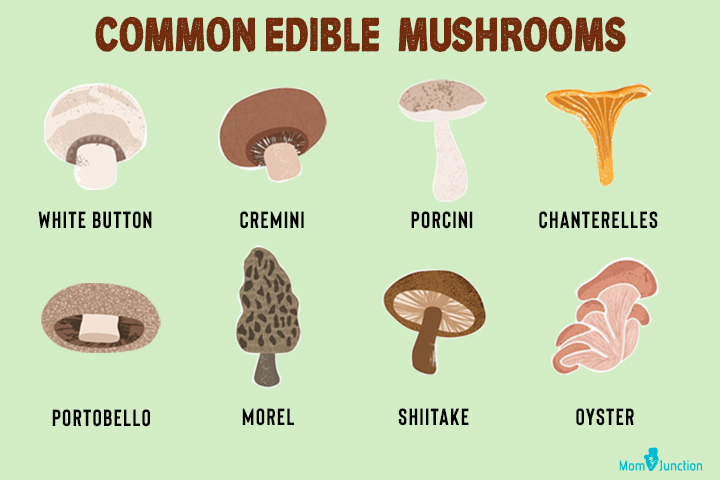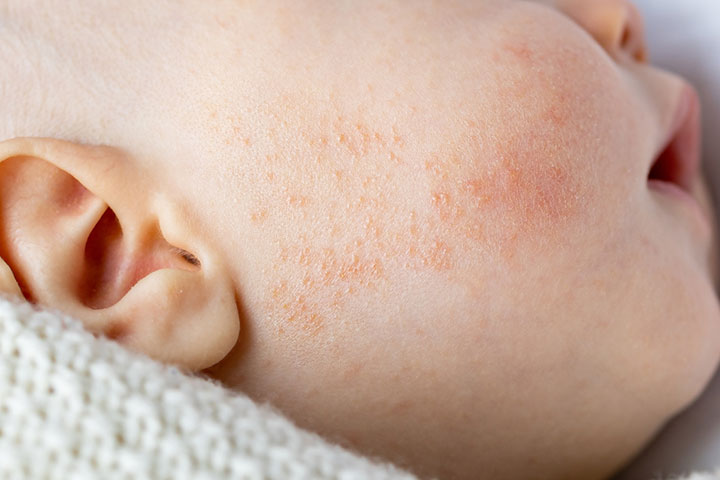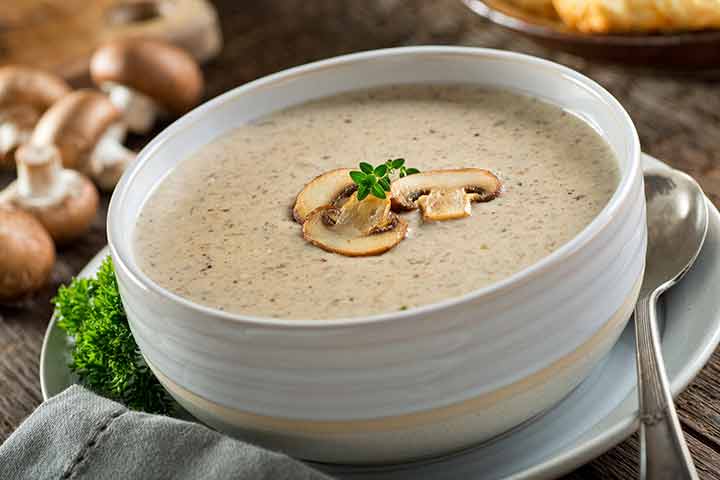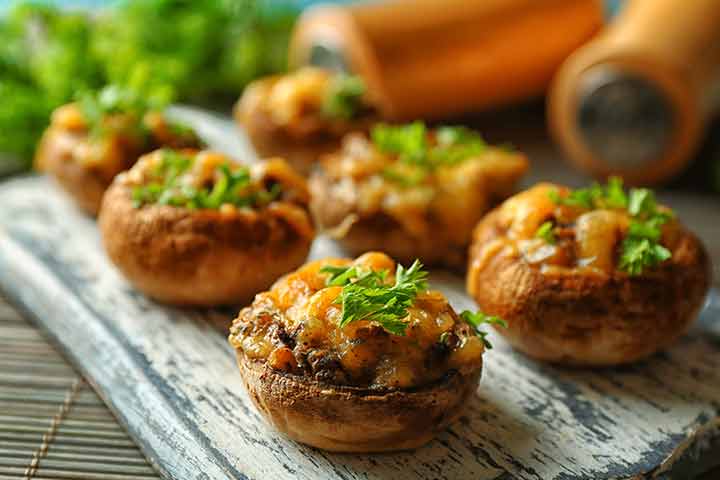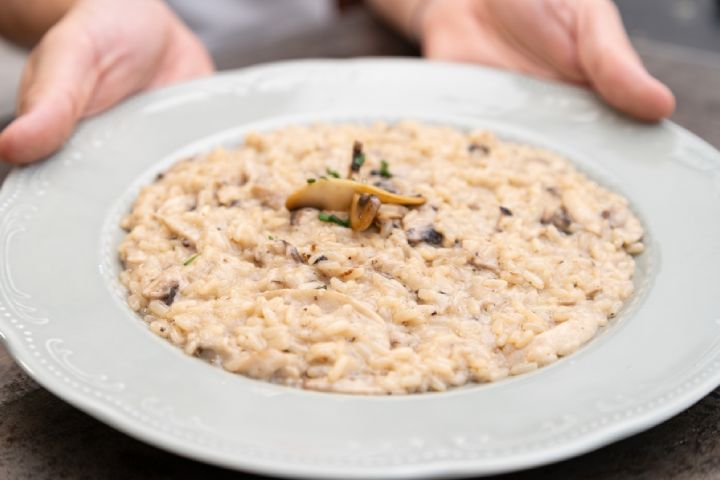Mushrooms for babies can make a healthy addition to the solid baby food diet. The edible fungi come in various varieties, but only a few are edible. Some species of mushrooms, such as Amanita phalloides (Death cap), are poisonous, while Amanita muscaria (Fly Agaric) may cause stomach cramps and vomiting if eaten raw.
You must pick the right variety of mushrooms if you wish to include them in your baby’s diet. In this post, we acquaint you with the right age to introduce mushrooms to babies, their benefits, and precautions to observe while feeding them.
Mushrooms And Their Edible Varieties
There are approximately 2,000 different species of edible mushrooms (1). Out of these, the most popular edible species is Agaricus bisporus. It is sold in three different varieties: white button, cremini, and portobello (2).
The white button mushroom is the most commonly consumed mushroom in the world, followed by cremini or baby bellas, portobello, shiitake, straw, oyster, chanterelle, morel, porcini, and enoki (1) (3). Most of these varieties can be grown at home. However, there are some wild varieties, which are grown in the wilderness and available in retail stores and farmer’s markets.
Is It Safe For Babies To Eat Mushrooms?
It is safe for babies to eat mushrooms when they are purchased from a retail store. This is important as certain wild varieties of mushrooms can cause discomfort to babies, while some others might be life-threatening.
Julianna Coughlin, a Massachusetts-based registered dietitian nutritionist, says “Largely mushrooms are accepted as safe to be eaten by kids and as soon as they are able to eat solid foods. It is just that you should keep in mind that mushrooms are a fungus and may cause GI upset in the babies if they have a tendency for that.”
At What Age Can Babies Have Mushrooms?
There are no clinical or non-clinical recommendations regarding when babies can eat mushrooms. Generally, mushrooms are given to babies once they are six months old. However, some parents might want to wait until 10-12 months of age. It is best to consult a pediatrician or pediatric dietitian before giving mushrooms to a baby.
Never feed raw or uncooked mushrooms Raw mushrooms should not be eaten raw by anyone, any age as they might cause discomfort and have an increased risk of poisoning. Mushrooms, when picked right and cooked well, can supplement your baby’s diet with a number of vital nutrients.
Nutritional Value Of Mushrooms
Mushrooms are much valued for their umami (savory) taste and unique nutritional composition. Each variety and sub-type has a unique nutrition profile. Below is a general nutritional profile of mushrooms with the quantities of key nutrients (4) (5).
- Water content: 80 – 90%
- Dietary fiber: 8 – 10%
- Protein: 12 – 35%
- Vitamins: C, B1, B2, B3, B9, and Ergosterol (precursor of vitamin D2)
- Minerals: Potassium, sodium, iron, zinc, selenium, and phosphorus
Mushrooms are rich in certain bioactive compounds like polysaccharidesiXLarge carbohydrate molecules consisting of simpler carbohydrate chains that are primary dietary sources, tri-terpenoidsiXChemicals found in foods and drugs with properties such as anti-inflammatory, analgesic, and antipyretic, low molecular weight proteins, glycoproteinsiXGroup of proteins that play a critical role in proper body functioning, and immunomodulating compoundsiXSubstances that modulate or suppress immune system activity. It also contains negligible fat and is considered free of cholesterol.
Health Benefits Of Mushroom For Babies
The wide array of nutrients in organic mushroom can provide the following health benefits (6)
1. Immunity: Mushrooms possess immunity-strengthening properties. These properties are attributed to bioactive compounds such as polysaccharides (beta-glucan), triterpenoids, and minerals present in it (7). These compounds are known to boost innate and acquired immunity by activating different types of immune system cells (5).
2. Heart health: The fermentable fiber Beta glucan is a form of soluble dietary fiber that’s been strongly linked to improving cholesterol and boosting heart health and oligosaccharidesiXNaturally found carbohydrate molecules containing two to ten carbohydrate chainswork as prebiotics (5). Enhanced prebiotic content of the diet stimulates the growth of beneficial microbiotaiXA diverse group of microorganisms residing in an individual’s bodythat might help attenuate conditions such as obesity and cancer in the long run (8).
3. Antioxidant effects: In vitro studies have shown that mushrooms have potential antioxidant effects when consumed on a regular basis. The polysaccharides present in mushrooms are attributed to its antioxidative effects (9). Besides polysaccharides, mushrooms have various vitamins, minerals, and ergothioneine, which is a sulfur-containing essential amino acidiXMolecules that join together to form proteins that serve several functions in the body that has antioxidative effects (10).
4. Anti-inflammatory: A review paper published in the Journal of Food Chemistry referred to edible mushrooms as “superfoods” and recommended it as a valuable addition to the daily diet (11). The presence of bioactive compounds such as polysaccharides, proteoglycans, terpenoids, phenolic compounds, steroids, and lectinsiXCarbohydrate-binding proteins commonly found in plant and animal foodsare attributed to mushroom’s natural anti-inflammatory property (12).
5. Antimicrobial: A study published in the Iranian Journal of Pharmaceutical Research showed that mushrooms have strong antimicrobial activity in vitro (13). Also, mushrooms are considered to have an indirect antiviral effect due to the immunostimulating activity of polysaccharides (14). Mushrooms could also have a potential antifungal activity that could prove useful. However, more research is warranted to understand the mechanism of action.
6. Hepatoprotective effects: Various studies show possible hepatoprotective (liver-protecting) effects of mushrooms (15). The studies also validate the use of mushrooms in folk medicine. Thus, the addition of mushroom in the baby’s diet could keep the liver healthy in the long run.
Mushrooms have their benefits, but it is also vital to know the potential risks of mushrooms.
Health Risks Of Eating Mushroom For Babies
Consumption of mushrooms can present the following risks to a baby.
1. Allergy: Mushroom allergy can be air-borne, oral, and contact based. Lycoperdonosis is a rare respiratory illness caused by inhalation of spores of the Lycoperdon mushroom (16). Similarly, rare but possible cases of mushroom allergy caused by ingestion have been documented (17). Mushrooms are considered “antigenically-rich,” which means that they can contain more than one allergen (18). Still, mushrooms rarely cause an IgE-mediated hypersensitivity reactioniXAn allergic immune reaction presenting with a range of symptoms (19).
2. Poisoning: Mushroom poisoning most commonly occurs due to the consumption of a wild mushroom. However, it could also happen due to the consumption of raw or undercooked mushrooms. The toxins that cause poisoning in such cases are largely unknown (20). Shiitake dermatitis is an example of a selective rash type that can occur when raw or undercooked shiitake mushrooms are consumed (21).
Mushrooms purchased from a reputable farm or retail store can be safely consumed. However, it is always wise to take precautions while selecting, storing, and preparing mushrooms to avoid any adverse effects.
Tips To Select, Store, And Prepare Mushrooms
The following precautions can help mitigate the risks of consuming mushrooms.
- Only buy mushrooms marketed as edible. Never choose wild mushrooms for babies.
- Pick fresh mushrooms that have a firm texture, even color, and tightly closed caps.
- Clean mushrooms properly before cooking. To clean, soak them in water for ten minutes and then rub-off any dust or dirt visible on its surface.
- Cut off any visibly damaged section of the mushroom.
- Some mushrooms, such as shiitakes, need to have their stem trimmed before cooking.
- Fresh and cleaned mushrooms can be stored in a paper bag for a week. However, it is best to use them within a week and ensure proper storage to prevent spoilage.
Mushrooms can be a valuable addition to your baby’s diet. Below are some recipes that you might like to try to complement your baby’s daily meals.
Mushroom Recipes For Babies
Evelyn, a mother and blogger, recently shared her experience introducing her 9-month-old son, Aedan, to a more diverse menu. She explained, “Aedan is nine months old, and he is really picky when it comes to food. I realized that he will eat A LOT more when his food contains more ingredients and has a richer taste.
“To allow Aedan to have a taste of the ‘adult food,’ I tried to cook his food using the same ingredients that I used to cook for my own food without adding seasoning … Aedan can eat a whole bowl of Mommy’s homemade chicken mushroom with sweet potatoes and carrot puree porridge for lunch! He really loves it a lot. I have tasted it myself and it’s really flavorful (i).”
If you’re looking to introduce your baby to new flavors, mushrooms are worth considering. Mushrooms can be added in soups, sautéed pieces as finger foods, mushroom curry added to brown rice, or grilled mushroom with dips. These mushroom-based meals can be added to a baby’s diet during weaning. Below are a few recipes that you might like to try.
1. Mushroom soup
Mushroom soup can be a warm, tasty, and comforting for your baby at around six months of age. Apart from being pleasing to the gut, it is filled with nutrients that are crucial for baby’s growth and development.
You will need:
- 300 grams shiitake mushroom (freshly chopped)
- 700 grams oyster mushrooms (freshly chopped)
- 1/2cup sage leaves (freshly chopped)
- 3 large shallots (sliced)
- 4 cloves garlic (chopped)
- 3tsp thyme (minced)
- 2 bay leaves
- 1tsp freshly ground black pepper
- 1/3tsp turmeric
- Salt (to taste)
- Extra-virgin olive oil
- Water
How to:
- Take a thick bottom iron pan and put it on medium heat.
- Once the pan is heated, pour two to three tablespoons of oil in it.
- As oil gets warm, add shallots, and sauté for five minutes or until they turn light brown.
- While stirring constantly, add salt and garlic and cook for another five minutes.
- Now add thyme, sage, and mushrooms and mix everything well.
- Once everything is mixed well. Add bay leaves, turmeric, and water. Cover the pot, reduce the heat to low, and let the content in the pot simmer for 20-25 minutes.
- After 25 minutes, check for mushrooms, if they are tender, switch off the flame and remove bay leaves. Keep the pot aside and let it come to room temperature.
- Now, carefully blend the mixture for a couple of minutes or until you get a velvety, smooth paste. Add water to adjust consistency as the soup should be creamy, not too runny or too thick.
- Serve it warm with mashed potatoes. This preparation is a healthy and delicious way to add mushrooms into your diet.
2. Stuffed cheese mushrooms
This recipe is a perfect introduction to your baby’s finger food choices. It has the goodness of mushrooms and the richness of cheese. This recipe is packed with optimum nutrients for growing babies.
You will need:
- 200 grams white button mushrooms
- 1 onion (finely chopped)
- ¼cup cottage cheese
- 1/2cup mozzarella cheese (grated)
- 2tbsp bread crumbs
- 2 green chilies (finely chopped)
- 1/4cup coriander leaves (chopped)
- 2tbsp olive oil
- 1/2tsp tomato sauce
- 1/2tsp black pepper powder
- 1/2tsp oregano powder
- salt to taste
How to:
- Preheat the oven to 180 degrees Celsius.
- Meanwhile, wash mushrooms well in hot water mixed with salt. Clean them with fingers to ensure proper cleaning. Dry them with a kitchen towel.
- Now, twist the mushroom stems carefully and gently remove them from the mushroom caps. Chop these stems finely for the stuffing.
- Heat olive oil on medium heat in a pan.
- Once the oil gets warm, add garlic, green chilies, and chopped onions. Stir for a minute or until the onions become golden brown.
- Now, add the finely chopped mushroom stems in the mixture and fry for a few more minutes, till the mushroom stems have released all water. At this point, the mixture will look dry.
- Add pepper powder, salt, and bread crumbs. Stir well for another minute and remove the pan from the flame.
- Take a bowl and transfer the sauteed mushroom stem stuffing into it. Add grated cheese, oregano, and tomato sauce to it.
- Now, take the mushroom caps and stuff it with the stuffing. Press the filling tightly so that it doesn’t come out. Sprinkle little grated cheese again on the top.
- Take a baking tray, grease it with a few drops of olive oil. Now place all the mushrooms on it, leaving some space in between.
- Bake the mushrooms at 180 degrees celsius for 20 minutes or till you see the cheese melted with a golden crust.
- Serve these mushrooms hot with a dip or sauce of your choice.
3. Creamy mushroom rice
This creamy, warm, and delicious combination of rice and mushroom would be a wholesome lunch or dinner recipe for your little one.
You will need:
- 1 cup chopped mushroom (small pieces)
- 2tbsp butter
- 2 cups uncooked white rice
- 1 can chicken broth
- 1 can cream of mushroom soup
- Salt and pepper as per taste
How to:
- In a pot, add some butter and saute the mushrooms for around five minutes.
- Add the chicken broth and cream of mushroom soup to the above pot. Cover it with a lid and bring it to a boil.
- Add rice to the pot and give it a good stir.
- Add salt and pepper as per taste and cook till rice gets fluffy. Serve warm.
- All these recipes can be included in any of the meals to supplement your baby’s diet in a wholesome manner.
Both these recipes can be included in any of the meals to supplement your baby’s diet in a wholesome manner.
Many parents consider mushrooms for babies since it is a great way to add micronutrients, macronutrients, and other bioactive compounds to their diet. Store-bought mushrooms contain proteins, minerals, vitamins, fiber, polysaccharides, and immunomodulating compounds. These nutrients enhance immunity, improve heart health, and have anti-inflammatory effects on the body. However, since all babies are different, you may introduce a small quantity of cooked mushrooms initially and check for any allergies. If it suits your baby well, feed your baby mushroom in the form of soups or as part of other dishes.
Key Pointers
- Mushrooms are rich in water, protein, and other nutrients that help in boosting the baby’s immunity and keeping their heart healthy.
- Babies can consume thoroughly cooked mushrooms from retail stores.
- It is important to consult a doctor before feeding them mushrooms as they may develop allergic reactions or food poisoning.
Learn how to feed your baby safely with mushrooms! Watch this informative video and discover the best ways to prepare and serve mushrooms for your little one.
